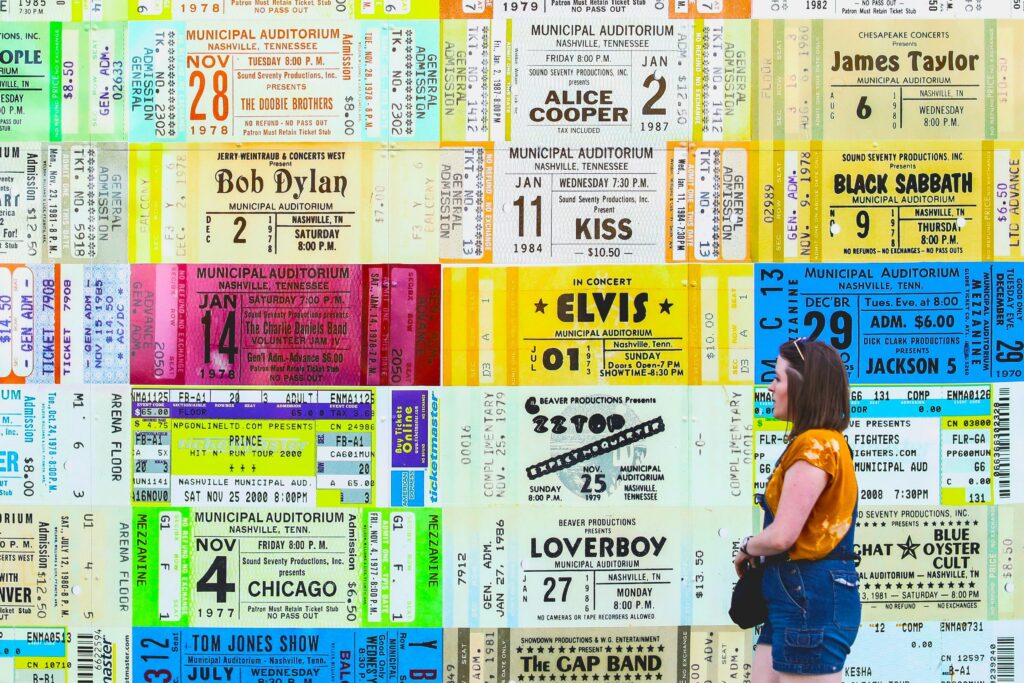6 Red Flags to Look Out For When Buying Resale Tickets

Picture this: your favourite artist announced a tour, and you signed up immediately for all of the official ticket sales and presales. Even with a lot of manifestation (and recruitment of family and friends), you still were not able to secure tickets to the show. It may feel like all hope is lost. Still, there is one more option to consider – resale tickets!
This type of ticket was purchased from an official seller (such as Ticketmaster or AXS during the original sale) and is now being sold again. The price could be the same or could vary, and you might not even be able to talk directly to the new seller (often called a “reseller”). Some people even post about selling tickets without having them in hand, leading to fans being scammed and lots of tears. With all of this in mind, it’s important to be diligent and cautious when buying resale tickets. We’ve found the 6 red flags to be on the lookout for when purchasing tickets to a show from a reseller.
Posting Tickets Before A Tour Is On Sale
Have you ever wondered how websites like StubHub and SeatGeek will have tickets uploaded for shows that haven’t even had their official ticket sales yet? Those listings are usually tickets that a reseller expects to be able to purchase but doesn’t have in hand yet. While you may feel like it’s better to get a ticket early, wait for the official presales and other sales to ensure that a ticket posted is legitimate. Even after that, the reseller may not actually have the ticket and could essentially “steal” your money without giving you anything in return (since not all sites require confirmations of the tickets). Keep that in mind and double-check that the ticket isn’t too good to be true!
Payment Methods and Fraud
Concert tickets are expensive, and resale tickets are often priced even higher than original tickets (so that sellers are gaining a profit on the sales). That makes it imperative that you are cautious about the payment method you are using. Avoid using direct payment methods (such as PayPal, unless it’s Goods & Services) or gift cards, since both could lead to you sending money to a seller, not getting legit tickets, and then not being able to dispute the cost with your bank. Try to find websites with fraud protection, use a credit card that allows you to dispute the charge, or use PayPal Goods & Services to be able to cancel a payment if needed.
Social Media Accounts That Are Not Actual Fans
If you were to search for an artist’s tickets on social media (such as X formerly known as Twitter, Instagram, and TikTok), you’d likely find many posts about selling tickets. These comments or posts may be very vague (with no specific location mentioned), which can be a sign of the seller not actually having tickets to sell. Additionally, if these accounts seem new, don’t post much, or don’t interact as a fan with the artist they’re selling tickets for, it is likely not a fan, and the tickets may be a scam. If you do find a legit fan selling tickets, ask them for a screen recording video of them swiping out of the DMs chat to the tickets. That way, you’ll be able to see that the tickets are official and will be able to be transferred to you (since many venues don’t accept just screenshots).
Beware of Resale VIP Tickets
From meet and greet packages to early entry options, many shows have at least one VIP tier for fans to purchase from during the original sale. However, these VIP perks are often not included with resale tickets. For example, if you bought a Taylor Swift ticket on StubHub that had a note saying it’s VIP (and has an increased price due to that), you would not be able to get the VIP benefits. If you were to find VIP tickets being sold on social media by a real fan, you should ask for the original purchaser’s name and photo of their ID for verification for the night of the show.
Cheap Tickets Are Not Always Good
Finding real cheap tickets to a concert, especially if it sold out, is like winning the lottery. It’s not easy – most cheap tickets are being sold by resellers who don’t actually have a ticket. Still, you may be able to find tickets for less than face value (the original price). To ensure that the price seems to be close to the current expected price based on the value and not to be extremely lower, you can call the venue to compare the original and new costs. Don’t rush to buy the cheapest tickets – you could end up with a lack of both money and tickets.
Check On Refund Processes And Policies
Rain, illness, and venue concerns could all lead to delayed or cancelled concerts. Additionally, something could come up in your schedule, leading to you not being able to feed. Buying tickets from a legitimate source or website with a refund process and policies will help you feel more comfortable with your purchase. Anything could happen on the day of the show, so making sure that you can get your money back if the show is cancelled will allow you to be more adaptable and able to help however you feel comfortable. Different websites have different rules, and whilst StubHub and SeatGeek may be trustworthy in one region, they are not in another so it is important to check their reliability and their regulations according to your location.
As you consider buying concert tickets this summer, I know that you will be able to swim by yourself. Keep these red flags in mind to avoid fraud and scams, and happy concert going!







